Cat. No:GM-87690AB
Product:Anti-BAFF hlgG1 Antibody(belimumab)
Cat. No:GM-87690AB
Product:Anti-BAFF hlgG1 Antibody(belimumab)
GM-87690AB-10 10 μg
GM-87690AB-100 100 μg
GM-87690AB-1000 1mg
Species Reactivity Human; Cynomolgus; mouse
Clone belimumab
Source/Isotype Monoclonal human IgG1, λ
Application Block assay; Bioactivity-ELISA
Specificity Detects BAFF
Gene BAFF
Other Names TNFSF13B, BLYS, CD257, DTL, TALL-1, TALL1, THANK, TNFSF20, TNLG7A, ZTNF4
Gene ID Q9Y275 (human); A0A2K5V2X4; Q9WU72 (mouse)
Background BAFF (B Lymphocyte Stimulator, also known as Blys) is an important cytokine that promotes B cell survival and proliferation. BAFF is produced by a variety of cell types, including plasma cells, dendritic cell and macrophages. BAFF supports B cell maturation, survival, and antibody production by binding to its receptors, such as BAFF-r, TACI, and BCMA. In immunology research, the development and research of BAFF antibody has attracted extensive attention, especially in autoimmune diseases and lymphoma and other pathological conditions. Increased levels of BAFF are associated with a variety of diseases, including lupus and rheumatoid arthritis, making monoclonal antibody of BAFF a potential treatment option.
Storage Store at 2-8℃ short term (1-2 weeks).Store at ≤ -20℃ long term. Avoid repeated freeze-thaw.
Formulation Phosphate-buffered solution, pH 7.2.
Endotoxin < 1 EU/mg, determined by LAL gel clotting assay
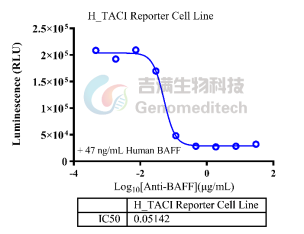
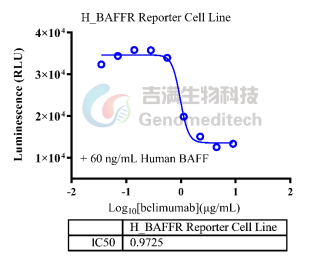
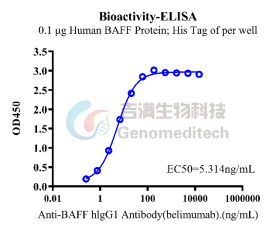
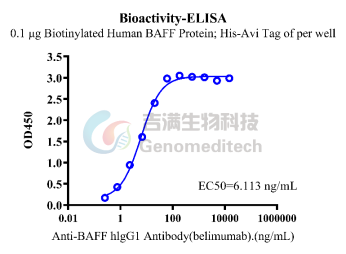
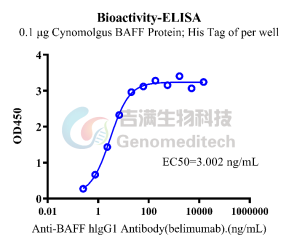
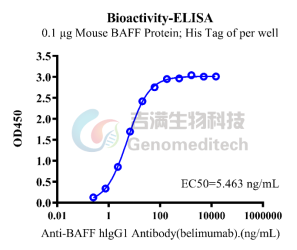
Cat. No:GM-87690AB
Product:Anti-BAFF hlgG1 Antibody(belimumab)
GM-87690AB-10 10 μg
GM-87690AB-100 100 μg
GM-87690AB-1000 1mg
Species Reactivity Human; Cynomolgus; mouse
Clone belimumab
Source/Isotype Monoclonal human IgG1, λ
Application Block assay; Bioactivity-ELISA
Specificity Detects BAFF
Gene BAFF
Other Names TNFSF13B, BLYS, CD257, DTL, TALL-1, TALL1, THANK, TNFSF20, TNLG7A, ZTNF4
Gene ID Q9Y275 (human); A0A2K5V2X4; Q9WU72 (mouse)
Background BAFF (B Lymphocyte Stimulator, also known as Blys) is an important cytokine that promotes B cell survival and proliferation. BAFF is produced by a variety of cell types, including plasma cells, dendritic cell and macrophages. BAFF supports B cell maturation, survival, and antibody production by binding to its receptors, such as BAFF-r, TACI, and BCMA. In immunology research, the development and research of BAFF antibody has attracted extensive attention, especially in autoimmune diseases and lymphoma and other pathological conditions. Increased levels of BAFF are associated with a variety of diseases, including lupus and rheumatoid arthritis, making monoclonal antibody of BAFF a potential treatment option.
Storage Store at 2-8℃ short term (1-2 weeks).Store at ≤ -20℃ long term. Avoid repeated freeze-thaw.
Formulation Phosphate-buffered solution, pH 7.2.
Endotoxin < 1 EU/mg, determined by LAL gel clotting assay





